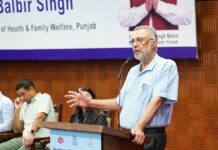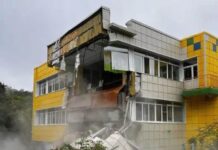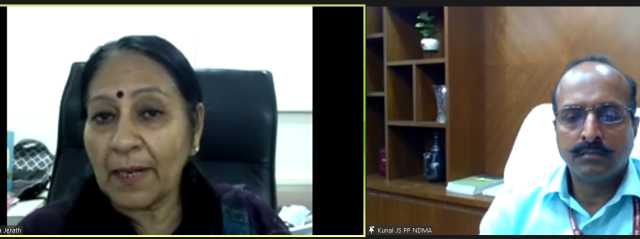Kapurthala | Pushpa Gujral Science City celebrated International Day for Disaster Risk Reduction by organizing a webinar. Around 100 school students from all over Punjab participated through virtual mode. The theme for this year celebration was “International cooperation for developing countries to reduce their disaster risk and disaster losses.” Mr. Kunal Satyarthi, IFS, Joint Secretary to Ministry of Home Affairs, GoI, National Disaster Management Authority, New Delhi was the key speaker at this occasion. During his talk, he said that natural and human-caused disasters affect thousands of people each year and can cause catastrophic loss of life and physical destruction besides mental trauma.
Whereas earthquakes, severe storms, hurricanes, tornadoes and floods are the most common types of natural disasters, others could be Wildfires, droughts, cloudbursts and landslides. Examples of human-caused disasters include fires, industrial accidents, shootings, acts of terrorism, and incidents of mass violence. He highlighted that 80% of geographical area of India is vulnerable to cyclones, floods, tsunamis, droughts, landslides or earthquakes and pointed out that without real action on climate in the next ten years, extreme weather events will be overwhelming, especially for developing countries. International cooperation for developing countries through Official Development Aid and capacity building is essential to boost disaster resilience in the face of extreme weather events and other natural and man-made hazards, he added. He emphasized upon making Disaster Management part of educational curriculum at all levels as well as the need to conduct frequent talks, seminars, training programs and live drills for children and youth to combat disasters.
Dr. Neelima Jerath, Director General, Science City, in her introductory remarks said that International Day for Disaster Risk Reduction was started in 1989 to promote a global culture of risk-awareness and disaster reduction. Disasters impact developing countries disproportionately, particularly in terms of mortality, numbers of people injured, displaced and rendered homeless, economic losses (as a percentage of GDP) and damage to critical infrastructure. She stressed on the need to step up investments in disaster risk reduction to eradicate poverty and hunger in the society and creation of scientific awareness on causes and actions required at the public level to ensure minimum loss to life and property and the facilities made available by the government to the public in the event of a disaster.
Dr. Rajesh Grover, Director, Science City, while delivering vote of thanks at the occasion said that Nature-based solutions, such as conserving forests, wetlands and coral reefs, can help communities prepare for, cope with, and recover from disasters, including slow-onset events such as drought. Further, these can also reduce the secondary impacts from non-climate-related disasters such as landslides following an earthquake, he added.








































